|
|
|
This page contains the following further information for learning and knowledge:
|
GLOSSARY
Applied research
Original work undertaken primarily to acquire new knowledge with a specific application in view. It is undertaken either to determine possible uses for the findings of basic research or to determine new ways of achieving some specific and predetermined objectives.
Educational institution
Any institution whose primary role is education. Included are schools, higher education establishments, colleges of technical and further education, public and private colleges. Excluded are institutions whose primary role is not education, for example, hospitals.
Episode of enrolment/attending a preschool program
An episode is the count of the occurrence of a specific characteristic. An episode refers to a preschool program provided to a child. When one child attends tow different preschool programs, the child is attending two episodes of preschool.
Experimental development
Systematic work, using existing knowledge gained from research or practical experience, which is directed to producing new materials, products, devices, policies, behaviours or outlooks; to installing new processes, systems and services; or to improving substantially those already produced and installed.
Higher education
Education offered by a university or other higher education institution, leading toward the award of a degree of higher level qualification.
Higher education qualifications
Includes Postgraduate Degree, Master Degree, Graduate Diploma, Graduate Certificate and Bachelor Degree.
Formal Learning
Refers to learning that is structured, taught learning in institutions and organisations and leads to a nationally recognised qualification issued by a relevant body, in recognition that a person has achieved learning outcomes or competencies relevant to identified individual, professional, industry or community needs. A learning activity is formal if it leads to a learning achievement that is possible to position within the Australian Qualifications Framework (AQF) and includes workplace training if such training results in a qualification.
Level of highest educational attainment
Identifies the highest achievement a person has attained in any area of study. It is not a measurement of the relative importance of different fields of study but a ranking of qualifications and other educational attainments regardless of the particular area of study or the type of institution in which the study was undertaken.
Non-formal Learning
Refers to structured , taught learning, but differs from formal learning in that it does not lead to a qualification with the AQF. It includes non-accredited workplace training, that is, training that does not leas to a recognised qualification.
Some examples of types of non-formal courses include:
- Adult education courses (eg. introduction to computing);
- Hobby and recreation courses (eg. ceramics, jewellery making, dancing);
- Personal enrichment courses (eg. personal finance, sports instruction, public speaking);
- Work-related courses (eg. manager development, job search training, induction courses);
- First aid courses;
- Bridging courses; and
- Statements of attainment.
Non-school qualification
Non-school qualifications are awarded for educational attainments other than those of pre-primary, primary or secondary education. They include qualifications at the Postgraduate Degree level, Master Degree level, Graduate Diploma and Graduate Certificate level, Bachelor Degree level, Advanced Diploma and Diploma level, and Certificates I, II, III and IV levels. Non-school qualifications may be attained concurrently with school qualifications.
People with a vocational or higher education qualification
Proportion of people with either a vocational or higher education qualification (includes those whose level could not be determined).
Preschool program
For the purposes of the National ECEC Collection, is defined as a structured, play-based learning program, delivered by a degree qualified teacher, primarily aimed at children in the year before they commence full-time schooling. This is irrespective of the type of institution that provides it or whether it is government funded or privately provided.
Pure basic research
Experimental and theoretical work undertaken to acquire new knowledge without looking for long term benefits other than the advancement of knowledge.
Qualification
Formal certification, issued by a relevant approved body, in recognition that a person has achieved an appropriate level of learning outcomes or competencies relevant to identified individual, professional, industry or community needs. Statements of attainment awarded for partial completion of a course of study at a particular level are excluded.
Strategic basic research
Experimental and theoretical work undertaken to acquire new knowledge directed into specific broad areas in the expectation of practical discoveries. It provides the broad base of knowledge necessary for the solution of recognised practical problems.
Vocational education training
Post-compulsory education and training, excluding degree and higher level programs delivered by higher education institutions, which provides people with occupational work-related knowledge and skills. Vocational education and training also included programs which provide the basis for subsequent vocational programs.
|
|
There are no references for this theme
|
Click on the links below to be taken to a summary of the graphs from the corresponding tab within the Learning and knowledge theme:
Overall progress?
Schooling
Further education
Research
|
| OVERALL PROGRESS? |
 |
Persons aged 25-64 years with a vocational or higher education qualification(a) |
 |  |  |
 |  |  |
Headline progress indicator |  | ...by qualification type |
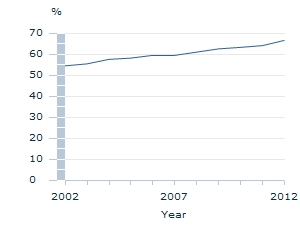
Footnote:
(a) Includes level not determined.
Source:
ABS data on request, 2012 Survey of Education and Work |  | 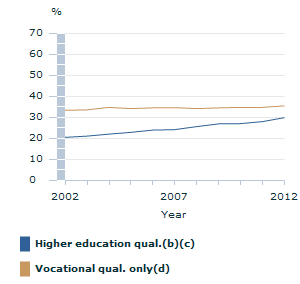
Footnote:
(a) Data based on level of highest non-school qualification.
(b) People with a higher education qualification may also have a vocational qualification.
(c) Includes, Doctoral degree, Master degree, Graduate diploma, Graduate certificate and Bachelor degree.
(d) Includes, Advanced diploma, Diploma and Certificates I to IV.
Source:
ABS data on request, 2012 Survey of Education and Work |
 |  |  |
 |  |  |
 |  |  |
...by sex |  |  |
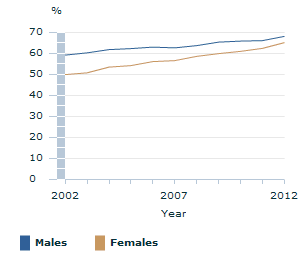
Footnote:
(a) Includes level not determined.
Source:
ABS data on request, 2012 Survey of Education and Work |  |  |
 |  | |
 |  |  |
 |  |  |
|
| SCHOOLING |
 |
Attainment rate of Year 12 or Certificate III for people aged 20-24 years |
 |  |  |
 |  |  |
Progress indicator |  | ...by sex |
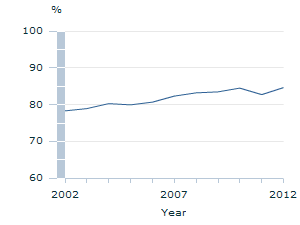
Source:
ABS Education and Work, Australia - Additional data cubes, May 2012 (cat. no. 6227.0.55.003) |  | 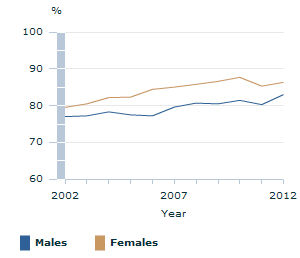
Source:
ABS Education and Work, Australia - Additional data cubes, May 2012 (cat. no. 6227.0.55.003) |
 |  | |
 |  |  |
 |  |  |
|
| FURTHER EDUCATION |
 |
Persons aged 25-64 years with a vocational or higher education qualification(a) |
 |  |  |
 |  |  |
Progress indicator |  | ...qualification type |
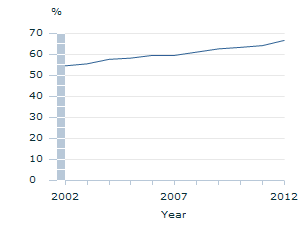
Footnote:
(a) Includes level not determined.
Source:
ABS data on request, 2012 Survey of Education and Work |  | 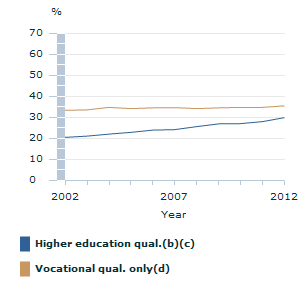
Footnote:
(a) Data based on level of highest non-school qualification.
(b) People with a higher education qualification may also have a vocational qualification.
(c) Includes, Doctoral degree, Master degree, Graduate diploma, Graduate certificate and Bachelor degree.
(d) Includes, Advanced diploma, Diploma and Certificates I to IV.
Source:
ABS data on request, 2012 Survey of Education and Work |
 |  |  |
 |  |  |
 |  |  |
...by sex |  |  |
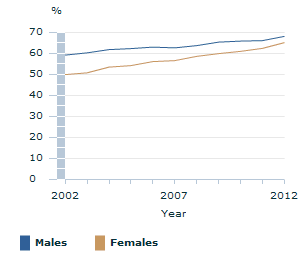
Footnote:
(a) Includes level not determined.
Source:
ABS data on request, 2012 Survey of Education and Work |  |  |
 |  | |
 |  |  |
 |  |  |
|
| RESEARCH |
 |  |  |
Expenditure on Research & Development for higher education organisations |
 |  |  |
 |  |  |
Progress indicator |  | ...by type of activity |
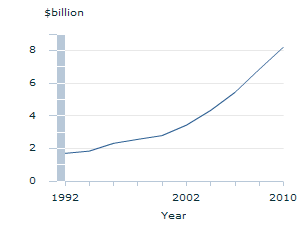
Source:
ABS Research and Experimental Development, Higher Education Organisations, Australia, 2010 (cat. no. 8111.0) |  | 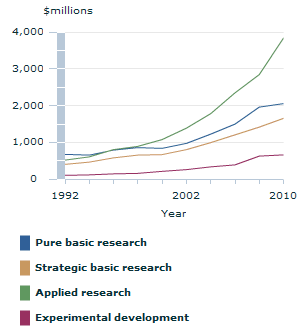
Source:
ABS Research and Experimental Development, Higher Education Organisations, Australia, 2010 (cat. no. 8111.0) |
 |  |  |
 |  |  |
 |  |  |
...by selected fields of research |  |  |
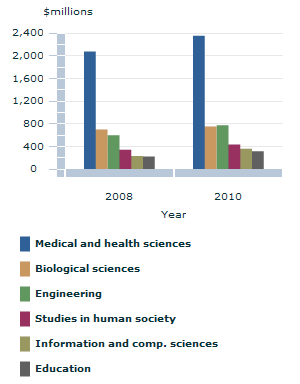
Source:
ABS Research and Experimental Development, Higher Education Organisations, Australia, 2010 (cat. no. 8111.0) |  |  |
 |  | |
|
|
|
|